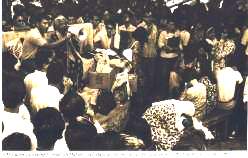THE
STUDENT MOVEMENT IN MALAYSIA,
1967-74 Hassan Karim
1967 : The Year of Transition
1967 is regarded as the transition year for the student movement as students began to raise vital issues relating to the lives of the people.
In the historic Teluk Gong landless squatter struggle, both the University of Malaya Students Union (UMSU) and the University of Malaya Malay Language Society (PBMUM) were directly involved.
In 1967 also, a symposium on problems faced by rural communities was held at the University of Malaya.
The fact that this symposium was sponsored by the PBMUM is significant, as prior to this, the PBMUM had mainly confined itself to issues of Malay culture and language.
In addition to this, 1967 saw the founding of the Socialist Club of the University of Malaya, the only political club in the University.
Its founding represented a new era for the student movement, and its influence on the Ma.laysian student movement was not insignificant.
In 1967, the student movement was still concentrated in the University of Malaya, though teacher-training colleges had their own student organizations.
This can be explained by the fact that conditions in the University of Malaya differed from the conditions in these colleges.
Various student bodies were to be found in the University of Malaya. The largest of these was UMSU, which represented all students of the University of Malaya.
By virtue of this, it had members from all racial groups. Other important student bodies included the PBMUM, th.e Chinese Language Society (CLS), The Tamil Language Society (TLS) and the University of Malaya Islamic Students Society (PMIUM) all of which were affiliated to UMSU.
Only the Socialist Club maintained autonomy. In 1967 too, several student bodies were led by progressive individuals like Syed Hamid Ali, who became the Secretary General of UMSU, and Sanusi Osman, who became President of the PBMUM. Both were also members of the Socialist Club. STUDENT MOVEMENT TODAy 3
The Teluk Gong Struggle

UM students listening to Sharifah
Mahani Syed Hamzah talking about the oppression of the peasants inTeluk
Gong.
The Teluk Gong struggle began as a struggle by poor landless peasants
to obtain land. In 1967, the peasants, led by Hamid Tuah, cleared some
forest land in the Teluk Gong region of Selangor where they tilled the
land and built houses.
Not long afterwards, the government destroyed the crops and demolished the houses of the peasants. Hamid Tuah and his followers were arrested.
The cruelty inflicted by the government upon the poor peasants of Teluk Gong was angrily denounced by the students of the University of Malaya.
Both UMSU and the PBMUM came out in open support of the unfortunate peasants. Several lecturers followed suit and also supported the struggle of Hamid Tuah and the peasants.
The involvement of students in the Teluk Gong incident was an important event in their struggle to uplift the poor, though their awareness of the life of the poor had previously been expressed in the form of seminars and symposiums.
The Teluk Gong incident enabled them to come forward to declare their stand. The Teluk Gong events clearly and dramatically highlighted the problem of rural poverty.
Poverty, which had its roots in landlessness or land hunger captured the attention of students, and became an important issue in the student struggle in the years to come.
1968 : National & International Issues.
An important national issue raised in 1968 was the National Education Policy; the PBMUM held a symposium on this subject.
For the PBMUM and many Malay students, the struggle for the sovereignity of the Malay language and the National Education Policy were important dimensions of their struggle.
In 1968, while the PBMUM was involved in the above causes, UMSU the National Union of Malaysian Students (PKPM) and the Socialist Club to raise such issues.
The invasion of Czechoslavakia by the Soviet Uniori in 1968 was met with widespread international opposition.
The students of the University of Malaya joined the protest and staged a demonstration outside the Soviet Embassy in Kuala Lumpur. Being the first demonstration by the students outside the campus, this was a historic event.
For the first time too, students were confronted with police brutality and tear gas. Undeniably, events outside the country contributed to increasing political awareness amongst students.
The revolt of French students against De Ganlle in 1968, for example, had a big impact on students all over the world.
So it was to be that in the years that followed, international issues were raised by students from time to time.
In 1971, the oppression of Muslims in Pattani was championed as was the Palestinian issue in 1973.

